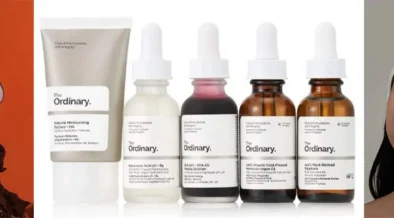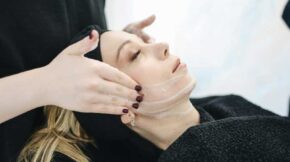Featured Post

Fashion

Outfit Style Is More Than Just Clothes, It’s a Vibe Let’s get this straight—Outfit Style isn’t just about tossing on clothes and hoping for the best. Nah, it’s your personal billboard. It’s mood, memory, and maybe even that coffee stain on your favorite jeans (don’t act like you don’t have one). When I was 22, […]
-
 Embroidered Details That Tell a Storyreba May 29, 2025
Embroidered Details That Tell a Storyreba May 29, 2025 -
 Granny Sandals Are Back in Stylereba April 14, 2025
Granny Sandals Are Back in Stylereba April 14, 2025 -
 Maximalist Jewelry Is Taking Overreba April 14, 2025
Maximalist Jewelry Is Taking Overreba April 14, 2025 -
 Why OULAI Should Be Your New Go-To Beauty Brandbunty April 6, 2025
Why OULAI Should Be Your New Go-To Beauty Brandbunty April 6, 2025 -
 Girls Trending Outfit for Summer: Stay Stylish & Coolbunty April 2, 2025
Girls Trending Outfit for Summer: Stay Stylish & Coolbunty April 2, 2025
Beauty

Glow Naturally: Discover Your Best Skin with EclatGlow At EclatGlow.shop, we believe that radiant, healthy skin isn’t just a luxury—it’s something everyone deserves. That’s why we’ve created a carefully curated skincare collection designed to bring out the best in your skin, naturally. Our mission is simple: to empower you with clean, effective products that work […]
-
 Secret Beauty Tips for Face That Work Like Magic!bunty March 12, 2025
Secret Beauty Tips for Face That Work Like Magic!bunty March 12, 2025 -
 Joynfunmall Natural Beauty and Wellness Awaitsbunty February 13, 2025
Joynfunmall Natural Beauty and Wellness Awaitsbunty February 13, 2025 -
 Take Care Acne Skin: The Ultimate Guide to Clearer Skinbunty February 11, 2025
Take Care Acne Skin: The Ultimate Guide to Clearer Skinbunty February 11, 2025 -
 Skin Care for Face Glow: Achieve Radiant Skin Naturallybunty February 11, 2025
Skin Care for Face Glow: Achieve Radiant Skin Naturallybunty February 11, 2025 -
 Skin Care at Home: Best Routine for Healthy Skinbunty February 9, 2025
Skin Care at Home: Best Routine for Healthy Skinbunty February 9, 2025
Most Popular
-
The best streetwear to start off the summerMay 28, 2022
-
BellaPrestige- Chic & Affordable Wallets with StyleMay 14, 2022
-
The Uniqueness of ArtMay 8, 2022
-
 Ultimate Health Goals: Your Wellness JourneyJanuary 27, 2025
Ultimate Health Goals: Your Wellness JourneyJanuary 27, 2025
Makeup

Perfecting Makeup for Black Women: The Doris Michaels Cosmetics Revolution When Doris Michaels Cosmetics was created exclusively for black women, it was born out of a realization: while many multinational brands offer darker shades in their makeup ranges, these products often fail to truly suit black women’s skin. Doris Michaels set out to create a […]
-
 The Ultimate 3in1 Portable Shaveradmin July 28, 2023
The Ultimate 3in1 Portable Shaveradmin July 28, 2023
Shopping

Custom Gifts Personal Touch: Our Passion, Your Memories Ever held something so simple yet so you, it made your heart skip a beat? That’s what we do here at N5Creations — craft memories you can hold. Let’s face it — the world doesn’t need another generic candle or mass-produced mug. What it does need? A […]
-
 Why OULAI Should Be Your New Go-To Beauty Brandbunty April 6, 2025
Why OULAI Should Be Your New Go-To Beauty Brandbunty April 6, 2025 -
 Donald Trump 47th President: Buy Collectible Merchandisebunty March 19, 2025
Donald Trump 47th President: Buy Collectible Merchandisebunty March 19, 2025 -
 Trending Products at Thesetrends.com – One-Stop Shop!bunty March 13, 2025
Trending Products at Thesetrends.com – One-Stop Shop!bunty March 13, 2025
Health

How Can Girls Keep Their Bodies Fit with a Balanced Diet? How Can Girls Keep Their Bodies Fit? It all starts with what’s on your plate. You wouldn’t fill a sports car with cheap fuel and expect it to run smoothly, right? The same goes for your body. If you want that natural glow and […]
-
 Food for Health: Eat Right, Stay Strongbunty February 7, 2025
Food for Health: Eat Right, Stay Strongbunty February 7, 2025 -
 Best Food for Health: Top Nutrient-Rich Choicesbunty February 6, 2025
Best Food for Health: Top Nutrient-Rich Choicesbunty February 6, 2025 -
 Ultimate Health Goals: Your Wellness Journeybunty January 27, 2025
Ultimate Health Goals: Your Wellness Journeybunty January 27, 2025 -
 Stay Fit with Halsa Healingadmin August 6, 2024
Stay Fit with Halsa Healingadmin August 6, 2024
Jewellery

Maximalist Jewelry Is Taking Over: Loud, Proud & Dripping in Drama Okay, so let’s talk about Maximalist Jewelry—yes, with a capital M and J because it deserves that kind of respect. You know what I’m talking about: the kind of jewelry that walks into the room before you do. That necklace your grandma said was […]
-
 Early Halloween Sale: 40% Off at Anshik925Silveradmin October 2, 2024
Early Halloween Sale: 40% Off at Anshik925Silveradmin October 2, 2024 -
 Elevate Your Style with SamRichie: Waterproof, Lifetime Jewelryadmin August 27, 2024
Elevate Your Style with SamRichie: Waterproof, Lifetime Jewelryadmin August 27, 2024 -
 Discover Affordable Elegance at The Ring Guyadmin July 22, 2024
Discover Affordable Elegance at The Ring Guyadmin July 22, 2024 -
 Elegance Unveiled: Adorn Yourself with Elite Etchings Jewellry!admin December 1, 2023
Elegance Unveiled: Adorn Yourself with Elite Etchings Jewellry!admin December 1, 2023 -
 Dazzling Jewelry Gallery: Where Elegance Meets Personalized Giftsadmin October 23, 2023
Dazzling Jewelry Gallery: Where Elegance Meets Personalized Giftsadmin October 23, 2023
Dresses

Outfit Style Is More Than Just Clothes, It’s a Vibe Let’s get this straight—Outfit Style isn’t just about tossing on clothes and hoping for the best. Nah, it’s your personal billboard. It’s mood, memory, and maybe even that coffee stain on your favorite jeans (don’t act like you don’t have one). When I was 22, […]
-
 Embroidered Details That Tell a Storyreba May 29, 2025
Embroidered Details That Tell a Storyreba May 29, 2025 -
 Girls Trending Outfit for Summer: Stay Stylish & Coolbunty April 2, 2025
Girls Trending Outfit for Summer: Stay Stylish & Coolbunty April 2, 2025 -
 Comfortable Gildan T-Shirts for Menbunty February 23, 2025
Comfortable Gildan T-Shirts for Menbunty February 23, 2025 -
 Girls Trending Dress Design: Hottest Styles Nowbunty February 16, 2025
Girls Trending Dress Design: Hottest Styles Nowbunty February 16, 2025 -
 Modest Fashion at Evelyn’s Fashion: Elegant Modest Attireadmin January 4, 2025
Modest Fashion at Evelyn’s Fashion: Elegant Modest Attireadmin January 4, 2025































